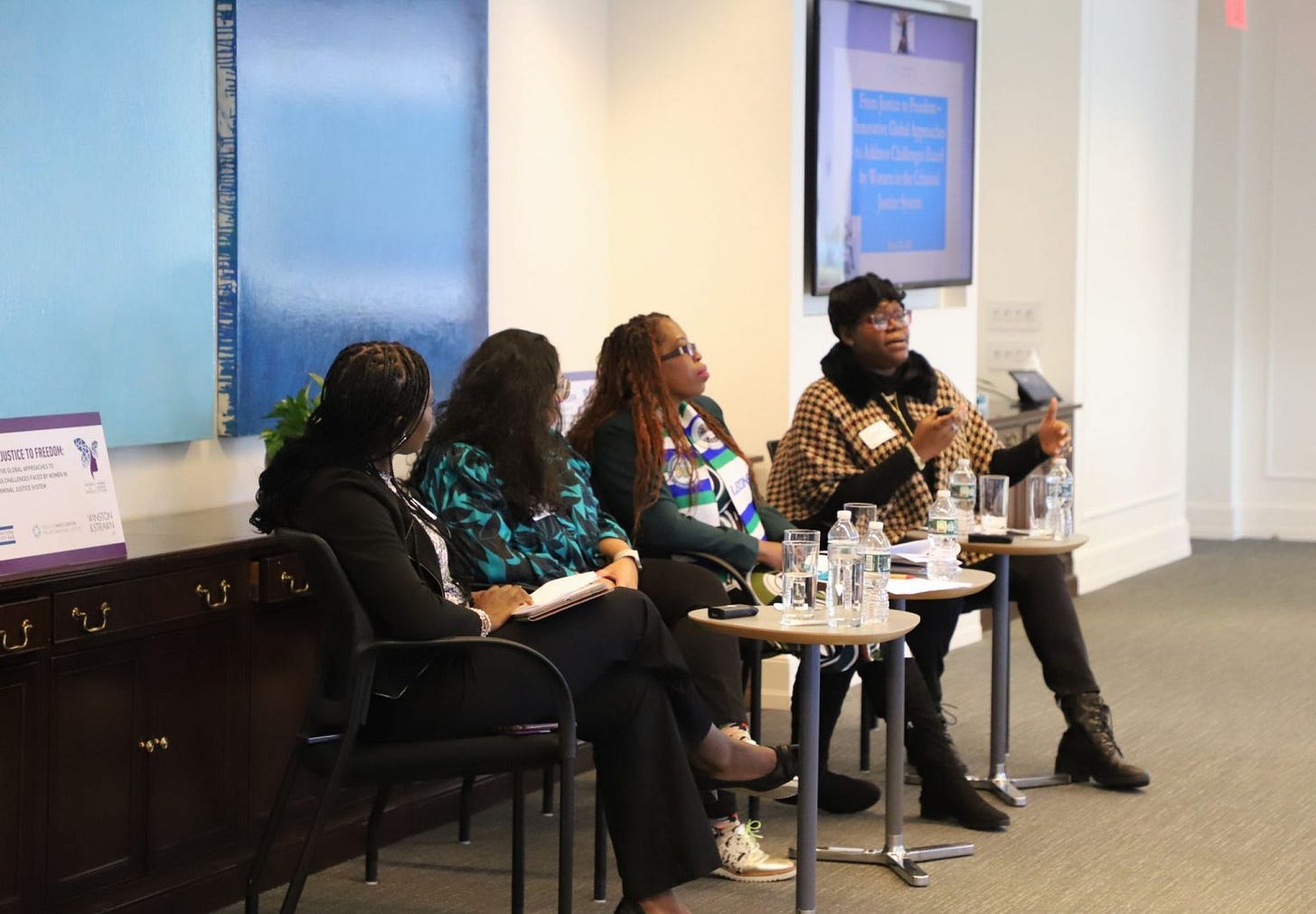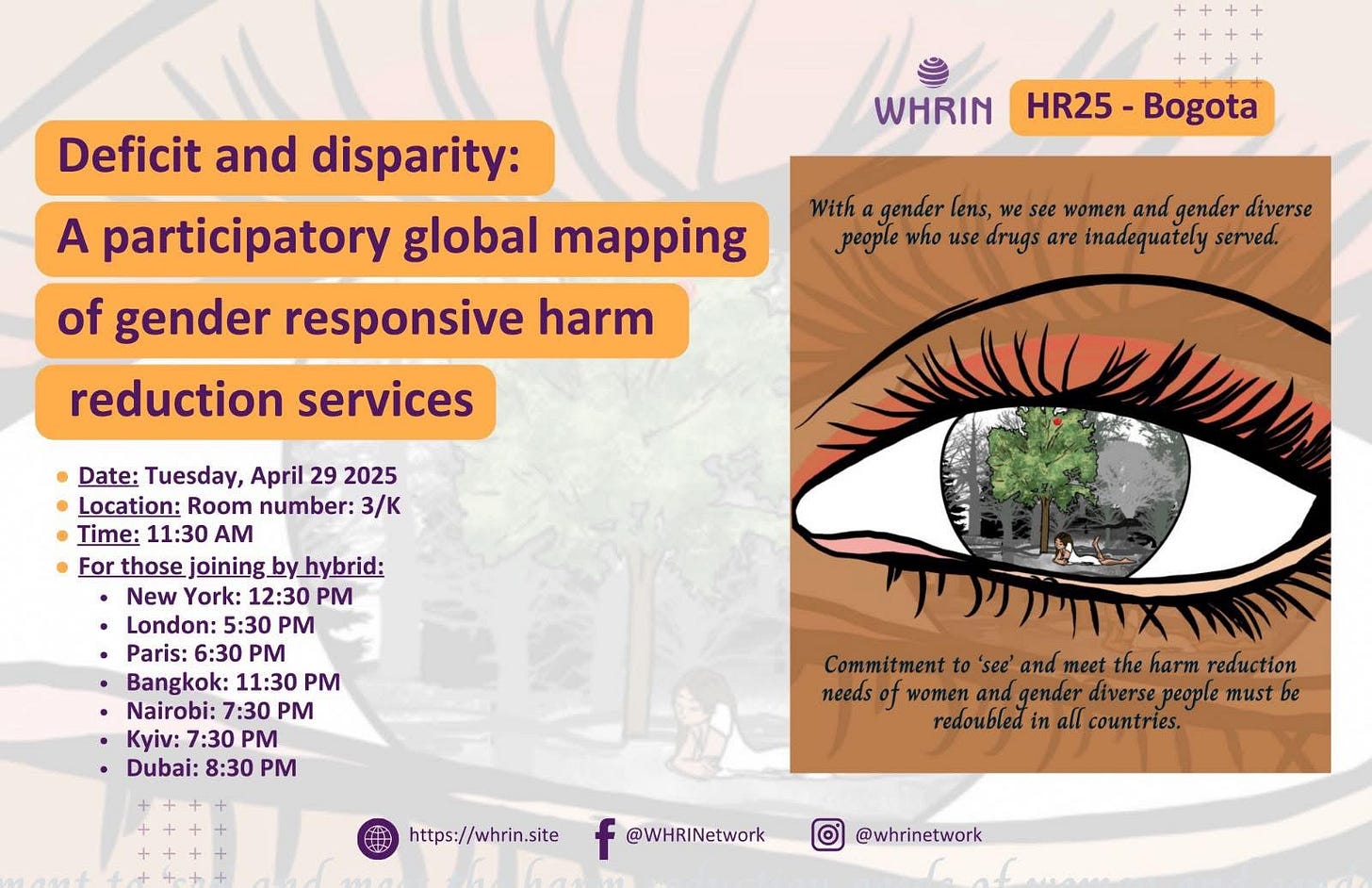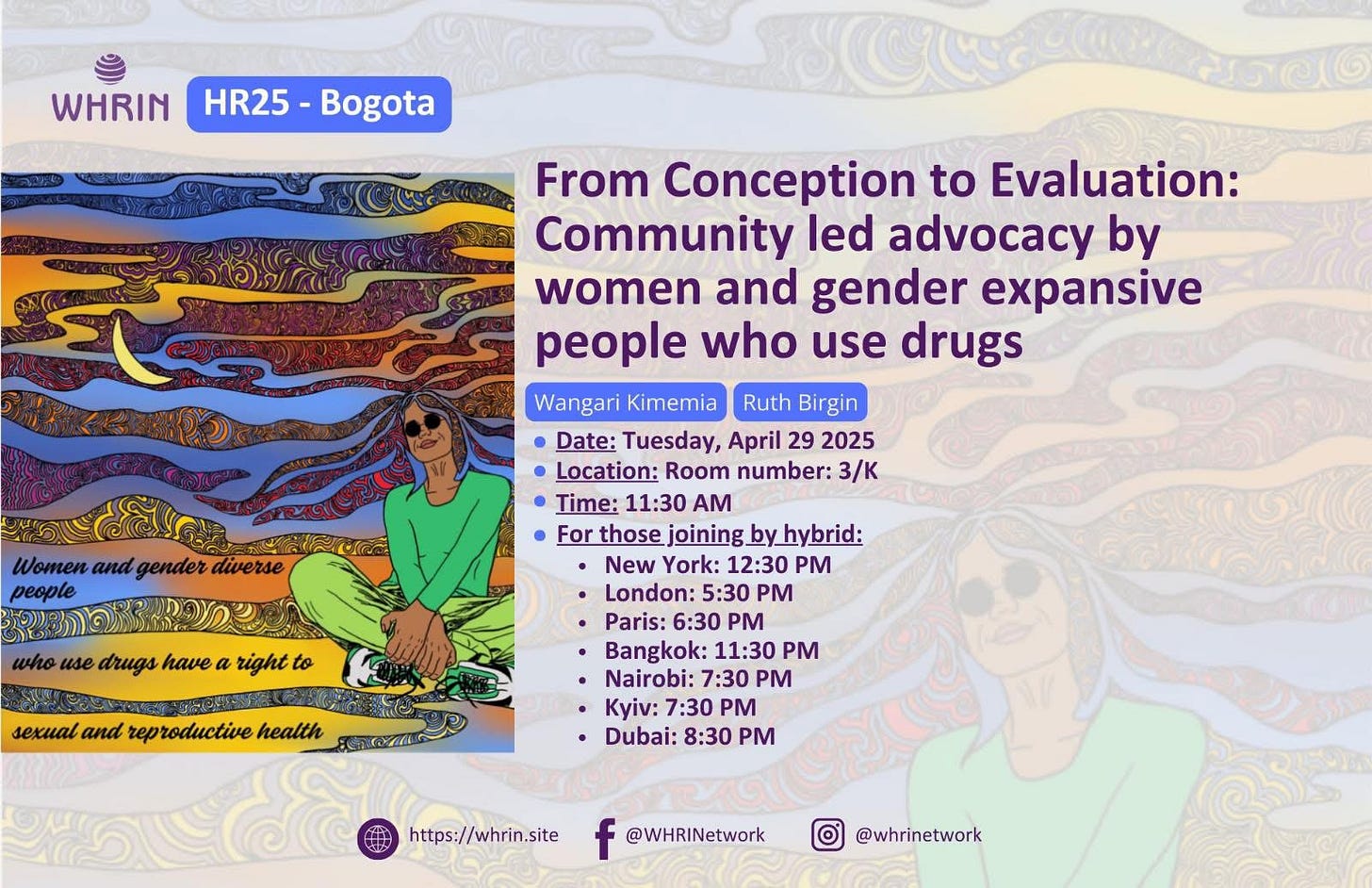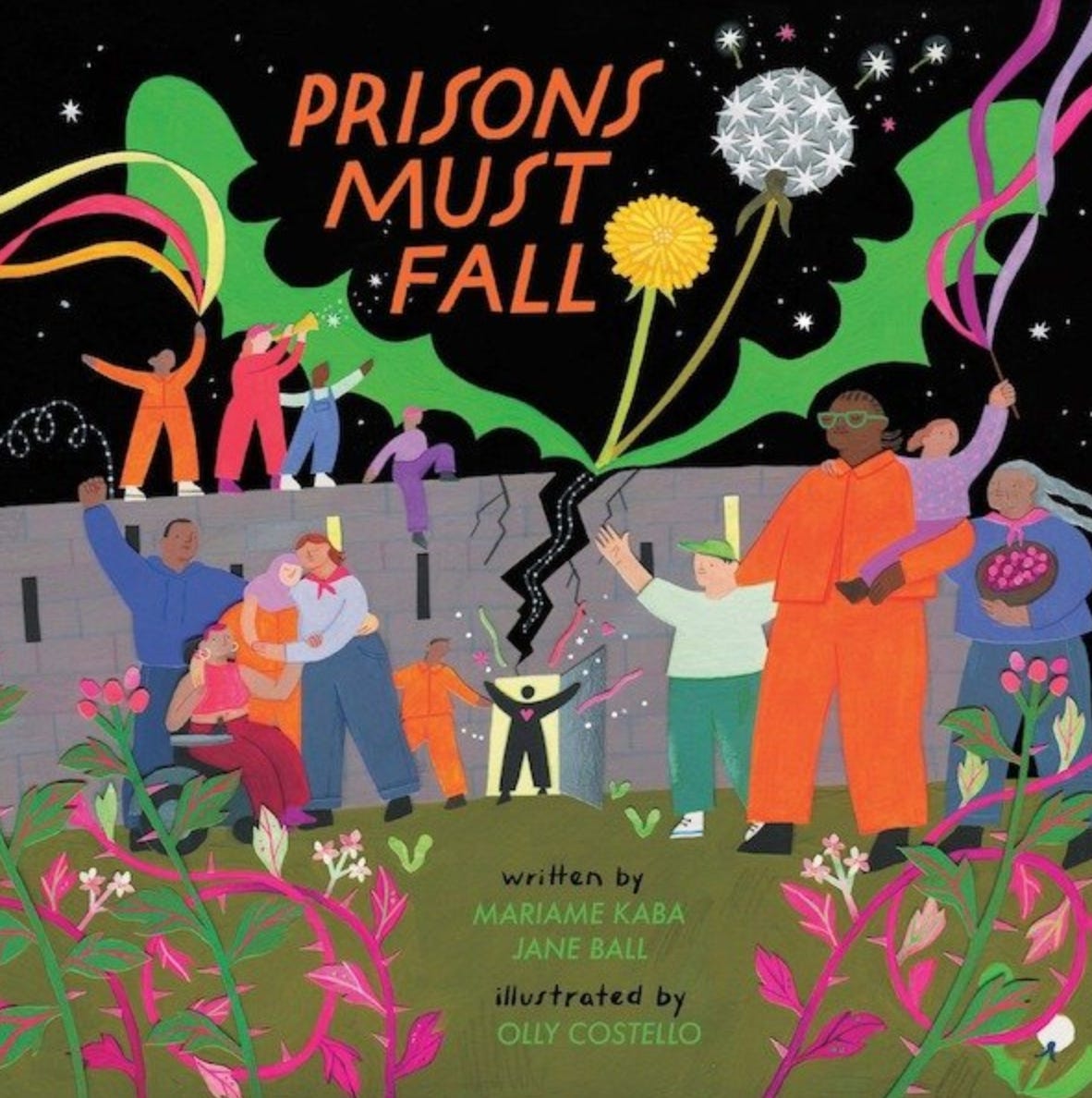Sex work and criminalisation; a reflection on CSW69; looking ahead to the Harm Reduction International Conference; opportunities, news and more
April 2025 newsletter from Women Beyond Walls
Dear Friends
Our recent report ‘From poverty to punishment’, published alongside Penal Reform International, explores the increasing rate of women’s incarceration globally. In particular, the report highlights laws and practices across the world which disproportionately criminalise women due to poverty, vulnerability and status. One key area highlighted in the report where women face disproportionate criminalisation is in relation to sex work.
Our report notes that “widespread misinformation perpetuates the conflation of sex work with trafficking and exploitation” which allows harmful policies and practices that “further marginalise sex workers and hinder efforts to support victims of trafficking.” Voices of sex workers in Thailand, Canada and India have exposed fear of anti-trafficking police raids and subsequent violence from law enforcement or detainment of the women. Women who have been trafficked, for example in the USA, are also often criminalised for activities they were forced or coerced to engage in and then face legal repercussions.
Research conducted by Human Rights Watch highlights that the criminalisation of sex work increases exposure of sex workers to abuse and exploitation by law enforcement, forces sex workers to work in unsafe areas due to fear of the police, undermines their ability to seek justice for crimes committed against them, and has a negative effect on their human rights such as access to healthcare and workers’ rights.
Curious to learn more? Here are seven organisations working on this issue:
The Global Network of Sex Work Projects (NSWP) exists to uphold the voice of sex workers globally and connect regional networks advocating for the rights of female, male, and transgender sex workers.
Decriminalize Sex Work (DSW) works to improve policies related to all forms of sex work and to end the prohibition of consensual adult prostitution in the United States.
European Sex Workers’ Alliance (ESWA) is a sex worker-led network representing more than 100 organisations in 30 countries across Europe and Central Asia.
The Sex Worker Education and Advocacy Taskforce (SWEAT) is South Africa’s leading sex worker rights organisation.
Asia Pacific Network of Service Workers (APNSW) has supported the establishment of new sex worker groups, fostered solidarity between groups, established partnerships with other networks, and is itself a formally registered organisation.
The Sex Work Donor Collaborative, or SWDC, is a network of funders that have come together to increase the amount and quality of funding to support sex workers' rights.
The English Collective of Prostitutes (ECP) is a network of sex workers working both on the streets and indoors campaigning for decriminalisation and safety. The below video is sourced from their website.
News from Women Beyond Walls
At the margins of CSW69, Women Beyond Walls co-hosted a powerful side event inside the United Nations alongside the Thailand Institute of Justice (TIJ), the Permanent Missions of Thailand, Canada, and Colombia to the UN, Penal Reform International, Pathfinders for Peaceful, Just and Inclusive Societies, and United Nations Human Rights (OHCHR). The event was titled "Promising Practices to Reduce the Harmful Impact of Imprisonment on Women," it marked 15 years of the Bangkok Rules and explored how justice systems can better respond to the realities of women’s lives—particularly the deep links between imprisonment, poverty, and inequality. TIJ shared key takeaways from regional consultations, and the event called for a shift away from incarceration, the inclusion of lived experience in policymaking, investment in sustainable solutions, and stronger gender-responsive leadership across justice systems.
During the discussion, we launched our new report. UN Women underlined the need for trauma-informed rehabilitation in response to the high rates of gender-based violence among criminalised women, while OHCHR and the UN Special Rapporteur on Extreme Poverty and Human Rights stressed that criminalising poverty is a violation of fundamental rights. The event reaffirmed a growing global commitment to justice reform rooted in dignity, equality, and care. As we reflect on 15 years of the Bangkok Rules, we know that progress demands concrete action, sustained collaboration, and a clear focus on those most affected.
Women Beyond Walls was also honoured to take part in From Justice to Freedom: Innovative Global Approaches to Address Challenges Faced by Women in the Criminal Justice System, hosted by the Vance Center and Winston & Strawn LLP. This powerful conversation explored gender-sensitive strategies to prevent incarceration, ensure fairness within prisons, and support women post-release. Alongside global leaders—including our founder Sabrina Mahtani, Simitie Lavaly, Isabel Maldonado Cepeda, and Jhody Polk—we shared and learned from innovative approaches that challenge systemic bias and promote justice and dignity for women. The event fostered cross-sector dialogue and highlighted the need for holistic, gender-equitable reform across the entire justice journey. You can read takeaways from the event here.
Our favourite and most energising part of CSW69 was connecting with other individuals and organisations working to end the over-criminalisation and incarceration of women. Too many to name here - but many of you are reading this newsletter! In a time when so many of us are feeling the weight of the current global funding climate, it was deeply heartening to witness a spirit of unity rather than competition. Despite the challenges, there was a powerful sense of solidarity and shared purpose—people showing up for each other, collaborating across borders, and collectively pushing for justice and change. It reminded us that even in difficult times, we are not alone in this work.
News from around the world
Australia - An inspection of the Southern Queensland Correctional Centre has highlighted the inhumane conditions incarcerated women in Queensland are experiencing, including inadequate healthcare and mental health support, low standards of prison clothing, concerns around hygiene, and issues with nutrition and food provided.
India - According to the India Justice Report (IJR) 2025 released on 15 April, in India fewer than 1,000 women are serving in top police ranks, with nearly 90% of all women in the police force concentrated in the lowest tier of the hierarchy—the constabulary. This matters because increasing women’s leadership and representation at all levels of the justice system is essential to challenging systemic bias, improving the treatment of women in custody, and shaping policies that reduce the over-incarceration of women. For more information on India, this article was recently published outlining some of the main challenges and opportunities.
Thailand - The Thailand: Annual Prison Report 2025, released in March by the International Federation for Human Rights, highlights a lack of progress in implementing key regulations that would allow currently incarcerated individuals to serve their sentences outside of prison facilities. Efforts to introduce alternative detention measures for those awaiting trial also remain stalled. This follows concerns raised in late 2024 by two United Nations bodies—the Committee Against Torture and the Working Group on Discrimination Against Women and Girls—both of which cited Thailand’s ongoing prison overcrowding as a critical issue within their mandates.
UK - Gaie Delap, a 78 year old environmental activist who was imprisoned for protesting against climate change with Just Stop Oil, has spoken of her negative experiences of the UK justice system and her time in prison.
UK - New data in the UK shows that pregnant incarcerated women are three times more likely to be diagnosed with gestational diabetes than those outside of prison.
UK - Following an independent review into the placement and care of girls in youth custody, the UK Government has acted immediately to end the practice of placing girls in young offender institutions.
USA - A 24 year old woman in Georgia was charged last month after she suffered a miscarriage and allegedly put the feutus in a dumpster. The charges have since been dropped, but have led to increased conversations around concerns about the criminalisation of miscarriage. Monica Simpson, Executive Director of the advocacy group SisterSong Women of Color Reproductive Justice Collective, has stated that in this case “the criminalisation of an obstetric emergency is a dire warning: those in power will stop at nothing to control our bodies.”
USA - Members of the California Legislative Women’s Caucus have introduced a number of bills with the aim of reforming women’s prisons in California.
Opportunities
The Spotlight Initiative is conducting global surveys on the role mental health plays in gender equality and women’s empowerment, with the research being undertaken by Prospira Global. They have a survey for organisations, as well as a survey for individuals, both of which are available in English, French and Spanish.
Each year, the Jude Byrne Emerging Female Leader Award recognises two remarkable women who are emerging as influential leaders in their communities. These leaders are chosen for their unwavering dedication to advocating for people who use drugs and advancing their health and rights on local, national, or international stages. Applications close 23.59 CET 5 May 2025
Join WHRIN and World Coalition Against the Death Penalty on 30 April for a virtual discussion on women facing the death penalty and the need for a gender lens for death penalty abolition advocacy - find more details here.
The Harm Reduction International Conference is convened by Harm Reduction International in a different city every two years. #HR25 is taking place in Bogota, Colombia from 27-30 April. A number of Women Beyond Walls allies are participating in or running workshops that can be attended online as well as in person. You can sign up to be a hybrid (virtual) attendee here to join the below events online.
Level Up UK are asking for support in their call for an investigation into the handcuffing of incarcerated pregnant women during labour. They are asking for individuals in the UK to write to the Secretary of State for Justice, Shabana Mahmood, and Director of HMPPS Amy Rees, to support their calls for an independent investigation into unlawful use of restraints.
Dr Shona Minson, research academic & member of the Women's Justice Board in the UK, is requesting information regarding any academic research which “explores the situation, experiences, and treatment of women who are criminal legal system involved" to help inform the work of the Board. You can find more information on how to share this on Dr Minson’s LinkedIn.
Share and support Birth Companion’s campaign ‘1001 Days in the CJS’ which is calling for “an ambitious new approach to pregnancy, birth and early motherhood across the whole criminal justice system.”
Women in Prison (UK) are recruiting an Impact Consultant to support them in developing a monitoring and evaluation framework for the implementation of their new strategy - you can find more details on their website.
Grow Transform Belong (UK) have launched their accredited training course for professionals working in the criminal justice system.
Media and literature recommendations
Watch our conversation with the International Network of Formerly Incarcerated Women and the International Drug Policy Consortium which marked International Women’s Day last month.
Read an article from our founder, Sabrina Mahtani, in Ms. Magazine highlighting the rising rates of incarcerated women and the global failures of the justice system.
Read Beyond Bars latest blog post titled How Prison Disproportionately Affects Women in Nigeria. The post highlights the key impacts of Correctional Centres on Women in Nigeria, including family disruption, gender-based violence and abuse, poor health conditions, economic hardship and legal and social exclusion.
Amnesty International have released their annual report on the global use of the death penalty. The report shares that global executions have hit their highest figure since 2015, as over 1,500 people were executed across 15 countries in 2024. Headlines of the report include Iran, Iraq and Saudi Arabia being responsible for 91% of executions; States are increasingly weaponizing death penalty against protesters and ethnic groups; and there is a rise in drug-related executions in violation of human rights.
The Death Penalty Project has released their Annual Report for 2024 which outlines their progress over the year, as well as their plans for 2025.
Another Woman’s Hour listen on issues in the UK - this episode discusses the recent report by the UK HM Chief Inspector of Prisons which has found that women in prison are resorting to self-harm because of considerable gaps in basic services, including strict time limits when contacting their children. The episode welcomes discussion with the Lead Inspector, Sandra Fieldhouse, and the views of the Lord Chancellor and Secretary of State for Justice Shabana Mahmood.
An incarcerated nurse has shared her significant concerns about the standard of healthcare provided to women in prison in the USA, and fears this will only get worse under the Trump administration.
Listen to In It Together: The Joint Enterprise Podcast which explores issues with cases where more than one person has been found responsible for the same crime. The four-part series features testimonies from previously incarcerated individuals and their families, as well as legal professionals and campaigners.
A children’s book recommendation: Prisons Must Fall by Mariame Kaba and Jane Ball talks about the harm that prisons cause, and gently explores more positive alternatives.
Children of Prisoners Europe have released their new report entitled Compassionate Sentencing: European perspectives on the rights of children with a parent involved in criminal proceedings. The report explores the importance of giving a voice to children affected by parental imprisonment and how compassionate sentencing offers a “justice-based yet empathic approach” to help ensure the rights and wellbeing of children remain central to their parents' criminal proceedings.
An important International Women’s Day 2025 watch entitled ‘What’s next for women’s justice?’ - hosted by Women in Prison (UK), the webinar explores challenges facing women in the justice system, the importance of grassroots activism and lived experience, and discussions around opportunities for change. The webinar also introduces Women in Prison’ new five year strategy which sets out their ambition to “build lasting systems change that radically reduces the harm experienced by women in contact with the criminal justice system by 2030.”
Read the article by Sisters Inside CEO and National Development Officer about the “deafening silence” around the issue of violence against women in prison, even around International Women’s Day when women’s rights are brought to the forefront of international discussions.
Thank you for following our newsletter, if you find it useful please share it with friends. Please also continue to share your news and important work that you want to be featured and tag us on social media so we can support and amplify.










